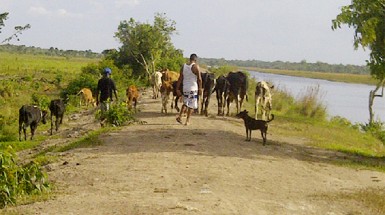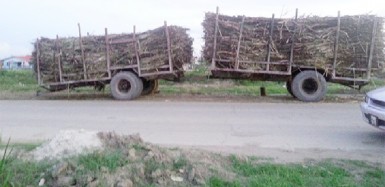Story and photos by Mario Joseph
![]() On the extremities of the West Demerara conservancy, at the furthest point of the Canal Number Two Polder road, live a quiet, peaceful and friendly group of inhabitants who simply just love the country life. The Canal Number Two Polder area is divided into several smaller villages, all of which are usually referred to as Canal Number Two by those who are either strangers to the area or just don’t know geography, according to residents.
On the extremities of the West Demerara conservancy, at the furthest point of the Canal Number Two Polder road, live a quiet, peaceful and friendly group of inhabitants who simply just love the country life. The Canal Number Two Polder area is divided into several smaller villages, all of which are usually referred to as Canal Number Two by those who are either strangers to the area or just don’t know geography, according to residents.
The very last village, called Line Dam, however is unique, because as denoted by its name it lines the conservancy dam. Its official name as depicted on utility bills reads, North Section, Canal Number Two Polder, Line Dam. But don’t let the sophisticated name fool you; life is very simple and as far as Sunday Stabroek observed, extremely easy going in the quiet locale.
A drive down the 7 mile stretch of asphalt, just off the West Bank Demerara Public Road leads to a line of houses lined on the right, while on the left, lush green terrain for the first few miles finally morphs into residences strung out along the bumpy, and at times potholed road. The two sections are divided into north and south by a large canal dug by African slaves during the Dutch era of Guyana’s colonial history.
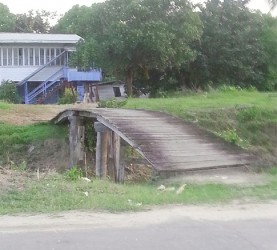
The demographics of the canal were different during colonial times when the area was used for the farming of sugar cane then subsequently for crops such as coffee, citrus, pear, etc. Today, however, most of Canal Number Two, with an estimated population of 8,000, is occupied by Indian Guyanese, while according to residents, Line Dam, with an estimated population of 1,000, is 100% Indian.
Canal Number Two has come to public attention in more recent times for the increasing number of road accidents and fatalities, most of which occur at night. Residents say that these occur because the road lacks adequate street lights and speed bumps, despite the fact that a school is located there, and many people traverse it.
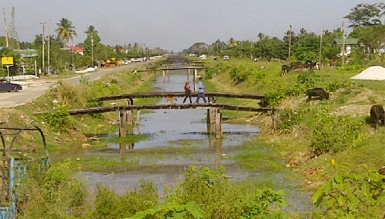
Livestock farming and horticulture seem to be the main occupations, with entire families engaged in them. Some children even abandon school to help on the farms, complained one local, who wished not to be named. Logging in the backdam area, also provides work for some residents.
Mohamed Shaheed Khan, a 54-year-old life-long resident said that the aforementioned occupations account for how some 80% of the people’s earn their living, while the other 20% hold jobs in Georgetown or work at the Wales Sugar Estate. Khan is a farmer of a variety of crops ranging from bananas, plantains and pineapples to cash crops like ochro and callaloo. This village elder was the one who helped with some of the history of the area as well as provide updated information on the village.
Khan said that there is one health centre that functions fairly well to serve all the communities that surround it. Further healthcare is sought at the West Demerara Regional Hospital. There are two primary, one secondary and one nursery school within the district, which he believes are in good condition. In addressing culture and religion, he said that Hindus dominate the zone, with the presence of two temples; Muslims who also have two mosques come next while Christians who account for the fewest adherents, have three churches. He noted that people are very religious which he thought may account for the minimal level of crime. The only ill of the community he highlighted was the presence of numerous establishments selling alcohol, while in the same breath, he raised concerns about the increasing number of road accidents along the entry road.
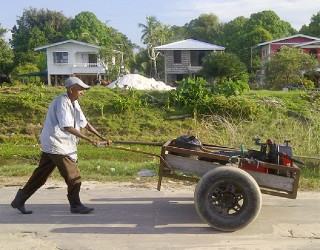
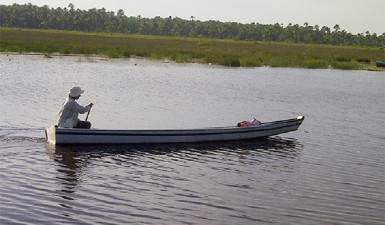
The elder, in describing life in Line Dam, said, “I enjoy living here because I have a lot of freedom; the neighbourhood is virtually crime free and peaceful. We don’t have to deal with thieves, quarrels and police issues. Life is good and balanced and people are generally happy. Family ties are strong and people associate well with each other.” Khan went on to say, “We get electricity, water and some of us have landline phones. We haven’t been severely affected by flooding since the great 2005 flood and one in 2004, both of which the government adequately compensated us [for], why won’t we be happy.”
In terms of recreation, Khan said that most persons swim, fish and play cricket.
In a different tone, a farmer who identified himself as Charlie, 46, said that the community is peaceful and a great place to live, but that the government has done nothing to uplift it. Charlie identified some issues affecting his community, starting with drug abuse among young men and boys. He said that this is a growing trend and it is being ignored. Another issue he pointed to was the road which he believes needs to be rebuilt, alleging that the repeated patchwork being done by the Neighbourhood Democratic Council is riddled with corruption. Asked if alcohol abuse was an issue, he responded, “It is just the same as everywhere else in this country, people drink a lot.”
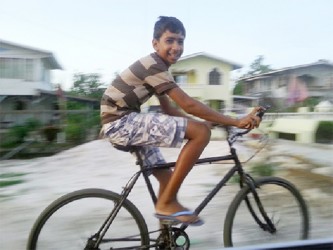

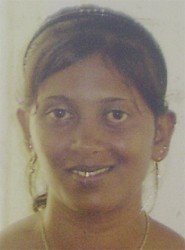
Thirty-year-old Dhanpattie Mansook and her brother are part of a farming family comprising parents and three children. Mansook said that she enjoys her life and recalls farming as being a pastime until it became her occupation as an adult. She said that her family farms and takes the produce to the market in Plaisance, East Coast Demerara because her father likes that market. Among the crops they produce are bananas, cherries and pineapples, in addition to which they rear sheep.
The younger brother said that water and electricity in the area is fair but that they lack landline telephones. He added, “We could really use the phones so that we could have internet to go along with the laptop we received from the One Laptop Per Family programme rolled out by the Government of Guyana.” All the children in the village have to take the laptops they received from the programme to school to get internet access.
Listing their suggestions to the government for the improvement of their community, the duo said, “We would like to see the roads improve and we could use some street lights.” They added, “mosquitoes are prevalent and the area could do with some of the vector fogging, Georgetown gets.” Asked if chikungunya has affected anyone they know, they responded in the negative. Overall they both agree that life in Line Dam is very good and environmentally friendly.
